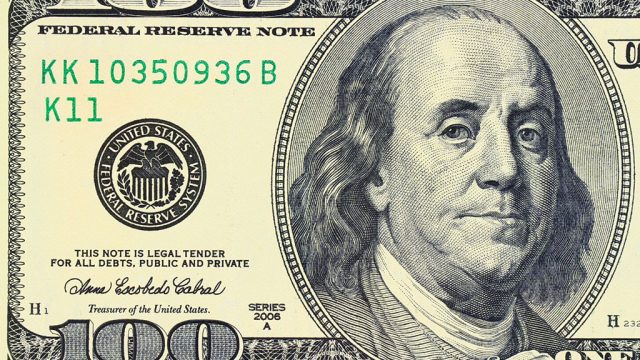Why Real Men Carry Cash

You remember cash, don’t you?
You may never have actually held any in your hand or walked around with it in your pocket, I realize. But you’ve probably seen it. Maybe you watched some geezer whip out his bankroll to pay for denture glue. Maybe you saw it in an old movie.
Cash was fun while it lasted. Sure, it had some drawbacks, but name a pleasure that doesn’t. Carrying actual hard currency meant you had to take responsibility. If through some recklessness you lost your cash, for instance, there was no toll-free number to call, no nice lady on the other end of the line ready to fix everything so you didn’t suffer. If you blew it on something crazy, there was no stopping payment. If a crook came along and forcibly relieved you of your dough, you were out of luck.
But the brazen, manly thrill of reaching into your trousers and hauling out a big fat . . . well, I could try all day to explain but I’ll never communicate the raw physical sensation. In fact, you would do better to just step away from your computer right now, go to your bank, withdraw some serious paper, and see for yourself. Walk right past the ATM, since the biggest bills you’re likely to find there are twenties, and while, technically speaking, twenties are money, they’re not the amplitude of currency we’re talking about here.
No—you should go to a bank teller, old-school-style, and withdraw at least a couple thousand dollars. That should be enough. If due to some temporary circumstance you don’t have a grand or two in your account, all liquid and ready for fun, then get as close as possible. This is no time to go cheap on yourself.
Take those bills and spend a minute or two on presentation. Meaning, don’t just jam them into your pocket as you might normally do with the pittances you’re accustomed to carrying. Do not put the bills in a billfold. Cash in the wallet is the first sign of an amateur—too easy for a pickpocket to lift. You’ll want those greenbacks as close to your skin as possible. Arrange the money so all bills face the same way and are in denomination order from biggest (hundreds) to smallest (ones, but not too many).
If you dimly recall seeing your grandfather’s money clip lying somewhere amid the dusty relics of masculinity past—in with the cigarette lighter, tie bars, pocket flask, junk like that—go dig it out. It’ll keep your bankroll neat, plus it will expose a quick flash of personal style to anyone who’s paying attention. If your roll is too big for the clip to contain, try an industrial-strength money-management tool: a thick rubber band. Roll those bills as tightly as possible, then wrap the rubber band around them. It should have the heft and hardness of a roll of silver dollars.
Now, go forth. Let it swing free. See how it feels to move among other men with that extra potency and power below the belt. Nice, right? A little brutish. A little primitive. It’s like having a third ball—you’re one up on other guys.
Of course, there are still legitimate occasions when only cash will do. Try to tuck your debit card into a G-string—or the shirt pocket of your favorite bartender. Back in the golden age of flashy cash, Frank Sinatra was known for never embarking on a night out with less than $10,000 in hundreds on hand, mostly for tips. Sadly, that kind of spectacle has gone out of style. (A young Leonardo DiCaprio immediately comes to mind, who famously bragged: “I’m the cheapest bastard in the world!” When he went out on the town, he was famous for driving the streets looking for a parking spot rather than paying for a garage.)
“I think that our entire problem with money today is that we don’t touch our money anymore,” says our most popular personal-finance sage, star of TV and bestseller lists Suze Orman. “The only way to get back in touch with financial reality is to touch your money. The same as there is only one way to get in touch with your true sexuality: to touch or be touched. You can fantasize all you want about it, but you need to touch or be touched to make it real. But we don’t touch our money, which is why it seems so unreal. We write checks. Kids think money comes out of the ATM machine.”
So yes, cash is dead. It’s been on its way out at least since 1949, the year two New York businessmen who came up short when their lunch bill arrived decided to start Diners Club, the first credit-card company. But I had high hopes that the financial crisis of the late-aughts might bring cash back into style. After all, if you don’t have it, you can’t spend it. We tend to forget that when we use a credit card, we’re simply buying cash from a bank and paying more than its face value. But that’s not the case. By the end of 2016, data showed that American households were holding more credit card debt than ever before. And a study conducted by researchers at MIT found that students would agree to pay about twice as much for tickets to sporting events if they were buying with credit cards instead of cash. It’s called the “credit-card premium.” Simply put: it means you’ll agree to spend more than things are worth if you can use plastic.
Unless you’re using a smartphone, of course.
For more amazing advice for living smarter, looking better, feeling younger, and playing harder, sign up for our newsletter—delivered every day!